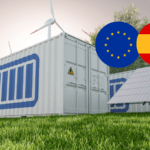The INTERSTORE team presents a new framework to accelerate the integration of data spaces in the energy industry.
A framework for energy data spaces developed within the EU-funded INTERSTORE project is expected to play a key role in accelerating the integration of data spaces within the energy sector. The framework is described in a recent article published in “Enlit”, an inclusive forum addressing all aspects of the energy agenda. The energy sector now more than ever requires secure and efficient data exchange. Challenges such as the rapid growth of renewable energy sources and smart grid technology and the increasing demand for energy flexibility point to the need for real-time, data-driven collaboration. “Sharing data between organisations enables a more coordinated approach to energy production, distribution and consumption,” write the paper’s authors, Ferdinando Bosco and Marcantonio La Franca of Engineering – Ingegneria Informatica S.p.A. (Italy), a partner in the INTERSTORE project. “This collaboration is essential for balancing supply and demand, seamlessly integrating renewable sources, predicting and mitigating outages, and optimising energy use across the grid”.
Steady and secure
However, as the energy sector digitises, robust data exchange mechanisms become more necessary. We need secure systems that can ensure the seamless integration of distributed storage, while protecting sensitive information and maintaining grid reliability.
“One of the main objectives of the energy data space framework is to establish an environment of trust and security. Through advanced data governance and authorisation protocols, each participant retains control over its own data, choosing what information to share and with whom, while ensuring compliance with privacy and security standards,” the article explains.
The framework uses standard architectures and building blocks from International Data Space and FIWARE. It has two core elements: the data space middleware and the energy data space connector. These features enable complete end-to-end data exchange between energy stakeholders, allowing them to collaborate through standardised, secure and trusted data exchange mechanisms. “The adoption of the data space is expected to have a transformative impact on the energy sector in the coming years. By creating a unified energy data market, the data space will facilitate better data exchange and interoperability across the European Union, improving the efficiency and reliability of energy systems”.
The Energy Data Space framework, which is currently being tested in real-world environments in Germany, Italy, Austria and Portugal, was one of the innovative solutions for advancing energy technology that INTERSTORE presented at the Enlit 2024 Conference in Milan, Italy. At the event, Antonello Monti, project coordinator at RWTH Aachen University, Germany, moderated an interesting session on collaborative initiatives for interoperability and participated in a podcast interview, providing information on the objectives and impact of the INTERSTORE project.
More information: European Commission







Leave a Reply